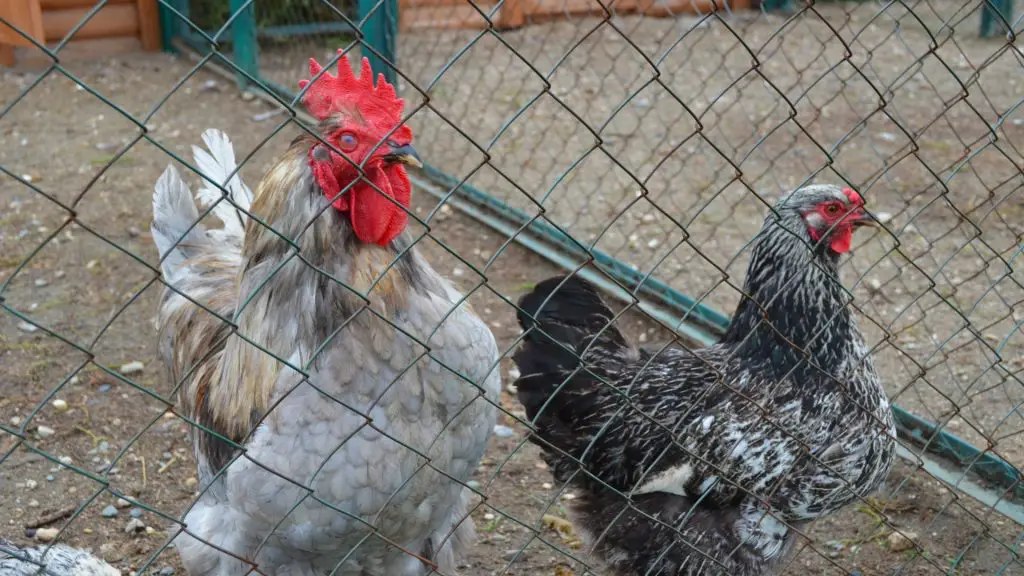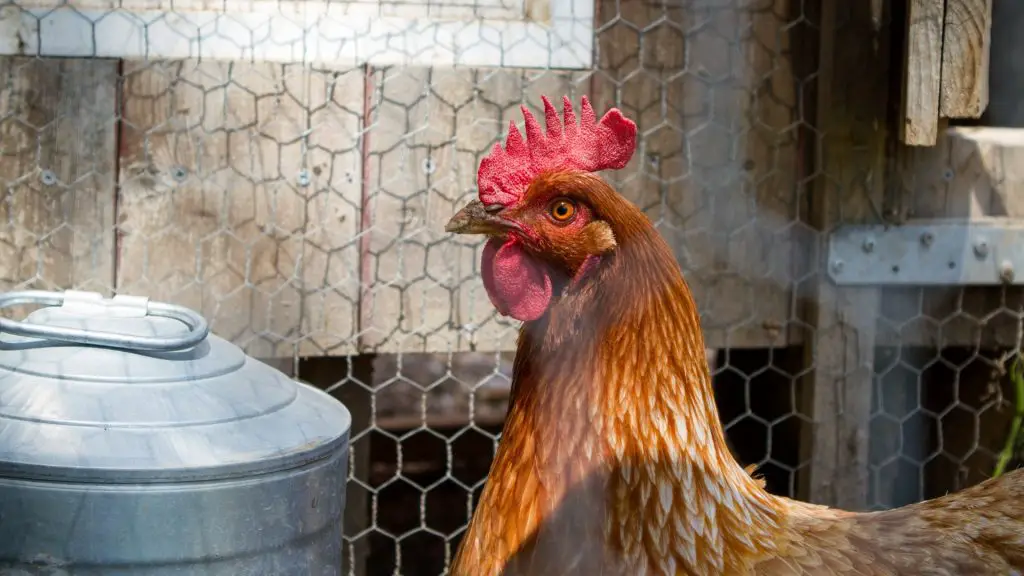Raccoons, weasels, foxes, cats, coyotes, dogs – these are some predators that might enter a chicken coop and finish off the poultry in the span of one night. Protecting the coop from predators is a priority for people who keep chickens, and the type of protection depends on the type of predator.
Is chicken wire predator proof? Chicken wire is not predator proof at all. It is used to keep chickens in, not keep predators out. Most predators can bite through chicken wire or reach through the larger links. So, it should always be used along with other methods to protect chickens from predators.
Read on to find ways on how to keep chickens safe from predators, as well as the uses of chicken wire.
Keeping Chickens Safe From Predators

To keep chickens safe from predators, poultry keepers and farmers first need to identify the type of predators attacking the chickens. A coop or pen can’t be protected from snakes the same way it would be protected from coyotes.
Here are some methods that can be used to safeguard chickens.
Related: How to Secure a Chicken Coop? | The Effective Guide
Keep Them Inside at Night
The first step to keep poultry safe is to encourage them to nest inside at night. Chickens have poor eyesight in the dark, and they are most vulnerable in the darkness.
Their natural tendency is to find a space to settle in for the night, so providing a well-defended chicken coop is the best way to protect chickens from predators.
Predator-Proof the Coop
After convincing chickens to roost in a coop, the next step is to defend the coop itself. When thinking about predator-proofing a chicken coop, consider the location, coop windows, height from the ground, and predator-proof latches.
Coop Location
Make sure that the chicken coop is situated in a space clear of any trees that aerial predators might nest in. You need this space around the perimeter of the coop that is free of any bushes or tall grass, what you call a “predator-danger zone,” to help discourage the predators from coming close to the coop.
Related: Where to Put Chicken Coop? | Information and Facts
Coop Windows
Keeping the windows open not only allows for better circulation within the chicken coop but also allows predators easy access. Therefore, it is important to cover the windows with wire. However, chicken wire is a risky choice since most predators can reach between the links or bite through it.
The best material to use to protect chicken coops runs and pens is weld mesh. When purchasing a weld mesh, consider the gauge. A 12 gauge 2.5 mm diameter mesh that is nailed across windows can keep even the wiliest foxes out of the chicken coop.
Height From the Ground
Raising the chicken coop is a great way to prevent predators such as skunks, raccoons, and snakes from living within. Rodents might also use the space to climb in and steal eggs, so chicken coops should ideally be raised at least a foot above the ground.
Predator-Proof Latches
A lot of predators like raccoons, possums, and foxes need to be considered when deciding on the kind of latches on the chicken coop. Raccoons, in particular, are very intelligent and can open simple latches like hook-and-eye latches. The best way to address this is to pick latches that need multiple steps to open.
Fence the Pen
With the coop secured, it is important to consider the pen that the chickens are in during the day. Fencing is essential, and when choosing the material, it is important to consider the following:
- Ensure that the wire is thick enough that predators can’t bite through it.
- Make sure that the gaps in the fencing are small enough to prevent even the most determined predator.
- Electric fencing is also a good option.
- Bobcats and coyotes are known to jump fences that are 4-feet high, so build the fences appropriately tall.
Reinforce the Ground
To prevent burrowing predators from accessing the chicken coop, it is important to run weld mesh underneath the coop. Connecting the underground weld mesh to the weld mesh fencing ensures that predators cannot dig under the fencing to get to the chickens.
Will Chicken Wire Keep Groundhogs Out?

While they aren’t predators, groundhogs are a nuisance to poultry farmers. As groundhogs are scavengers, they can spread diseases among the flock and must be kept out.
Chicken wire will not keep out groundhogs as they can bite through it. It cannot be used on its own as fencing against groundhogs. However, it can be used along with other materials like weld mesh, also known as hardware cloth.
Like more determined predators, a hungry groundhog will happily chew through chicken wire to get to the food.
Will Chicken Wire Keep Chipmunks Out?

While chipmunks aren’t strictly predators, they are a nuisance to poultry because they might eat eggs and will almost definitely introduce viruses to the flock.
Chicken wire will not keep chipmunks out because the holes in the chicken wire are large enough for these small rodents to slip through. Chipmunks need holes that are less than one inch (2.54 cm) in diameter, so the chicken wire is ineffective against them.
Weld mesh is the best defense against chipmunks, as the holes are too small for any animal to enter through them.
Uses of Chicken Wire

While chicken wire may not be useful for keeping predators and general pests away from chickens, there are other ways that chicken wire can be used in farms and gardens.
Protecting Chicken Feed From Other Animals
Farm animals can get into the chicken feed and polish off the entire thing but can get seriously ill if they eat too much of it. Wild birds in the area will also finish up all the feed if they have access to it. The strategic use of chicken wire can help prevent either of these things from happening.
How To Keep Goats Out of Chicken Food?
Goats and chickens are easy to raise together and can be placed in the same barn. Chickens eat the grains that the goats waste, and both are non-aggressive towards each other. But goats love chicken feed and can eat too much of it and make themselves sick.
To keep goats out of chicken food, always feed the goats first, hang up the chicken feed, and keep a small fence of chicken wire around the chicken food. The goats will be too full and will be easily deterred by the effort required to reach the feed.
While goats can chew through chicken wire, well-fed farm goats are not as determined or hungry as predators or scavengers and will not bother. The chicken wire will be enough to discourage them from trying.
How To Keep Pigeons Away From Chicken Food?
Wild birds like pigeons and sparrows are known for stealing chicken feed because it is easily accessible, and they can reach into it easily.
Keep pigeons away from chicken food by keeping the food in a space enclosed with chicken wire, weld mesh, or any other material. The enclosure must be covered on all sides, including the top, to keep pigeons away.
Chicken wire is more than sufficient to keep birds like pigeons away because they cannot fly through the holes.
Keeping Pests Out of the Garden
Small garden pests can be easily kept away by using chicken wire. The wire may be used as a fence around the garden, as well as in a trench to keep gophers from digging under.
Will Chicken Wire Keep Rabbits Out of the Garden?
Rabbits are common garden and farm pests that can eat most vegetables overnight.
Chicken wire will keep rabbits out of the garden as long as it is buried sufficiently deep enough and is sturdy enough to stay stable against any pushing. The wire should be buried about a foot (30.48 cm) into the ground to prevent burrowing as well.
In the winter, when rabbits are not a concern, the wire should be rolled up and kept inside to prevent it from getting damaged or worn down.
Related: What Killed My Chicken? | Chicken Predators
List of Sources
What Are the Best Ways to Protect My Chickens From Predators?
10 Basic Tips for Protecting Chickens From Predators-Grit How to Know
